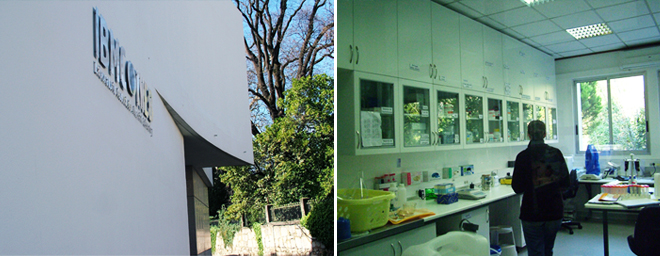About IBMC
IBMC is a multidisciplinary research institution that was formed in 1997 with the aim of bringing together researchers working within the University of Porto and affiliated hospitals to produce a unique environment promoting research in the life sciences. It became a Research Unit recognized and funded by the Foundation for Science and Technology (FCT) of Portugal; the main Portuguese government body that funds science.

At this stage, IBMC joined forces with the Institute of Biomedical Engineering (INEB), also funded by the FCT, and proposed the creation of an Associate Laboratory and requested funds to build a site that could house the two research communities. In 2000 the new building was inaugurated and the two Research Units became known as the IBMC.INEB Associate Laboratory (LA).
To ensure a completely multidisciplinary environment, IBMC will continue to foster the implementation of fully integrated scientific programs across the different Research Groups and pursue interdisciplinary approaches that have already emerged as a result of the unique environment within the Institute.
Declaration of Public Utility - Diário da República II série, nº284 - 11-12-2000 [PDF]
Research & Development Institutions Legal Framework
IBMC Association Members
Founding Members:
Joint Members:
|
Alexandra Moreira
Alexandre do Carmo
Alexandre Quintanilha
Anabela Cordeiro da Silva
Anna Olsson
Arnaldo Videira
Clara Sá Miranda
Claudio Sunkel
Deolinda Lima
Didier Cabanes
Francisco Carvalho Guerra (Assoc. Honorário)
Francisco Cruz
Graça Porto
Helder Maiato
João Morais Cabral
João Relvas
Jorge Azevedo
Jorge Sequeiros
Jorge Vieira
Maria Helena Carvalho
Maria João Saraiva
|
Mário Barbosa
Mónica Sousa
Nuno Alves
Nuno dos Santos
Paula Tamagnini
Pedro Moradas-Ferreira
Pedro Pereira
Pedro Rodrigues
Roberto Salema
Sandra Macedo Ribeiro
Teresa Summavielle
Vitor Costa
|
Gender Equality Plan
IBMC shares the same vision as i3S and its other two founding institutes -INEB and Ipatimup - regarding equality gender policies, and we have a common Gender Equality Plan. The information presented in the plan are the result of aggregating the data for each of this four institutes.
The CODE OF CONDUCT TO PREVENT AND COMBAT WORKPLACE HARASSMENT is also shared with i3S.
Transparency
GENERAL SCHEME FOR THE PREVENTION OF CORRUPTION
The General Scheme for the Prevention of Corruption (RGPC), created by Decree-Law No. 109-E/2021, of 9 December, determines the mandatory implementation of a Regulatory Compliance Program, which includes a risk prevention plan, code of conduct, training program, implementation of a whistleblowing channel and the designation of a regulatory compliance officer, by all services and legal persons of the direct and indirect administration of the State and private entities, employing 50 or more workers.
In line with the seven priorities set out in the National Anti-Corruption Strategy, the RGPC is intended to strengthen institutional practices of integrity and transparency, build a stronger ethical culture, as well as prevent and detect the risks of corruption and related infractions.
In turn, Law 93/2021, of 20 December, transposing Directive (EU) 2019/1937 of the European Parliament and of the Council, of 23.10.2019, established the general regime for the protection of whistleblowers, imposing the legal obligation to implement a whistleblowing channel, having adopted the same threshold of 50 or more workers.
Since June 2022, i3S/IBMC/Ipatimup, in compliance with the new RGPC, has been developing intense joint work towards the preparation and implementation of its Regulatory Compliance Program (relevant documents below). In this context, IBMC maintains the policy of trust and transparency on the way it develops its activities and relates to third parties. The complete information can be found at https://www.i3s.up.pt/rgpc.php
FINANCIAL REPORTS: 2007 [PDF] | 2008 [PDF] | 2009 [PDF] | 2010 [PDF] | 2011 [PDF] | 2012 [PDF] | 2013 [PDF] | 2014 [PDF] | 2015 [PDF] | 2016 [PDF] | 2017 [PDF] | 2018 [PDF] | 2019 [PDF] | 2020 [PDF] | 2021 [PDF] | 2022 [PDF] | 2023 [PDF] | 2024 [PDF]



































